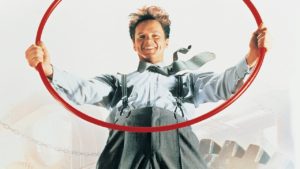The Hudsucker Proxy

Some critics dismiss The Hudsucker Proxy as “a flat-out misfire” (The Atlantic). Others, like Roger Ebert, have mixed feelings about its merits. And mostly all missed its underlying philosophy.
Although The Big Lebowski is often singled out among the Coen brothers’ oeuvre for its Eastern themes, some kind of Eastern thing also infuses The Hudsucker Proxy. Only where the Dude may (or may not) embody Chuang-Tzu’s comical Taoist ethos, Norville Barnes is more like a character in a Buddhist shadow play.
Shadow plays impart Buddhist lessons through telling old, familiar stories by projecting the shadows of puppets onto a screen. The Coens do a modernized version in their homage to old, familiar screwball comedies. Stock characters from the genre include the naïve, likable hero (Tim Robbins), an underhanded boss (Paul Newman), and a savvy female journalist (Jennifer Jason Leigh), all swept up in a zany scheme.
On another level, however, Hudsucker imparts some basic Buddhist insights: the illusory world these characters inhabit is the world of money, time, deception, confusion, and suffering (i.e., samsara). Norville talks about karma and the great wheel of life that gives everyone what they deserve. The circle he keeps showing everyone (you know, for kids!), evokes the simple Zen “enso” symbol representing the moment when the mind is free to let the body/spirit create.
Like a lot of traditional Buddhist literature, The Hudsucker Proxy doesn’t bang you over the head with its message; it subtly fills your mind like the aroma of a smoldering incense stick.
Related links:
https://www.rogerebert.com/reviews/hudsucker-proxy-1994
